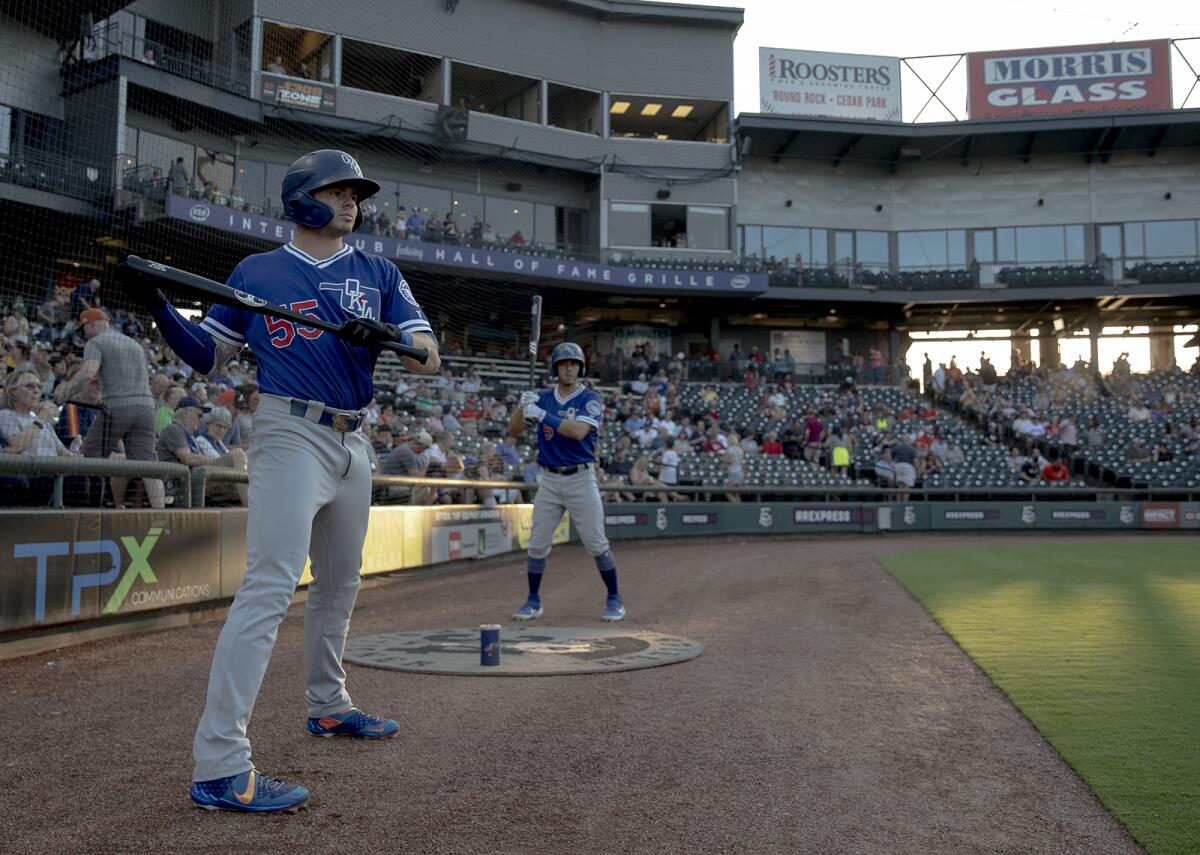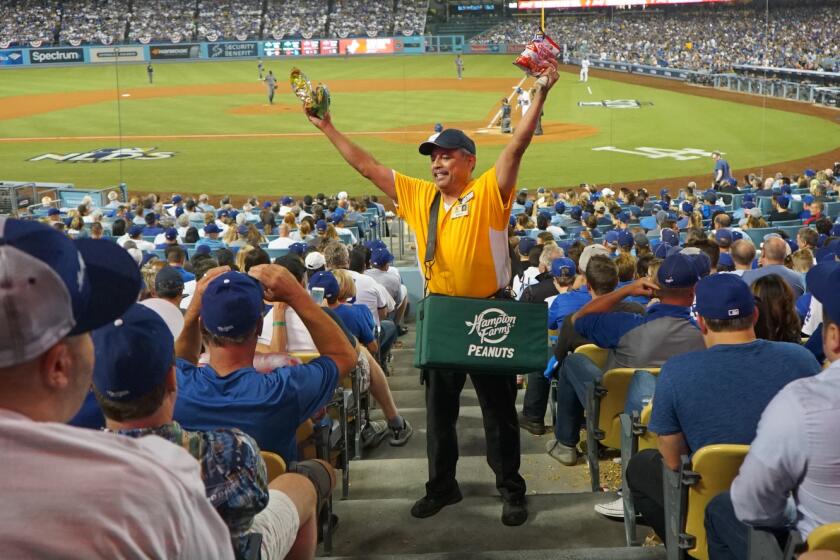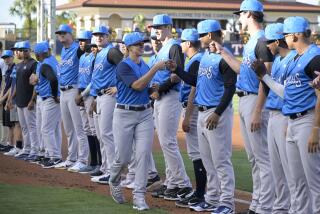Unpaid minor league baseball players struggle to make ends meet during shutdown

- Share via
The message went out just past midnight as Sunday turned into Monday: If any employers around the country had temporary jobs for minor league players, please let me know.
Emily Waldon hoped she could help. She works two jobs, one writing for the Athletic about baseball prospects and the other as customer service manager at a Mercedes-Benz dealership in Michigan. Perhaps a few people with work to offer could hire players who had not been paid in months, and whose next paycheck might not come for another several months.
Her tweet generated hundreds of job leads, for stock clerks and delivery drivers, for sales representatives and private coaches, and for more. A senior citizen in Cincinnati offered to pay for a minor leaguer to do some yard work and handyman chores.
Some folks had no employment opportunities, but they offered money. One player’s wife broke down in tears when Waldon said she could forward a $200 donation to help support the couple and their toddler.
Major League Baseball teams agree to contribute $1 million each toward a fund that will assist ballpark workers during the suspended season.
“I’m not doing this to say, ‘Look at what I’ve done,’ ” Waldon said. “I’m doing it because it’s not being done.”
For Major League Baseball, the coronavirus hiatus could have the unintended consequence of thrusting the issue of low minor league pay into an unavoidable and uncomfortable spotlight. For the advocates who have challenged MLB on this issue the last several years, this could be their moment.
“It’s the same regurgitation every year,” said Jeremy Wolf, cofounder of More Than Baseball, an organization that provides assistance with housing, food and equipment to minor leaguers. “You can just copy and paste from year to year.
“But now, something like this is on a bigger scale: I’m being forced home with no assistance from my team.”
Indeed, in a memo to teams Sunday, MLB said minor league players should “return to their offseason residences to the extent practical,” with exceptions for players rehabilitating injuries, or for those who would return to a high-risk location. Wolf said his organization provided $200 to a Venezuelan minor leaguer whose team provided an airline ticket to Caracas but no money for the seven-hour taxi ride from the airport to his hometown.
It has been less than a week since MLB shut down. Since then, the league has negotiated with the players’ union over salaries and facilities available to major league players, announced a $30-million fund to assist ballpark workers suddenly out of work, and announced donations to programs feeding children and senior citizens during the coronavirus crisis.
Assistance for minor leaguers remains on the to-do list for the league, which takes in an estimated $11 billion per year. The majority of teams, including the Angels, are awaiting guidance from the league.

The Dodgers, however, decided to pay the stipends they would otherwise have owed players through the end of spring training. In training camp, just as in the offseason, minor leaguers are not paid a salary.
“Our players came in after a winter of training with an expectation that, during spring training, we would provide assistance with housing and meals,” said Andrew Friedman, the Dodgers president of baseball operations. “Obviously, their spring training ended abruptly. Therefore, we wanted to help by providing their remaining allowance.
“Our hope was to alleviate some of their immediate concerns, as all of baseball continues to navigate this unprecedented situation.”
The San Diego Padres, Boston Red Sox, Miami Marlins, New York Mets and Tampa Bay Rays also are continuing to pay spring allowances to their minor leaguers, according to Baseball America. The Rays pay each minor league player $400 per week during the spring.
The minor league season was scheduled to start in early April, so it is uncertain what teams might do then. According to Garrett Broshuis, an attorney and former minor league player, the minor leaguers may be ineligible to collect unemployment insurance because they remain under contract to their teams — and thus employed by a business, even if that business is shut down.
In the meantime, Broshuis said, minor league players still face monthly payments such as car loans and phone bills. Players that attended college might have student loans too, because the NCAA allows 11.7 scholarships for every Division I baseball team, so even the best college baseball players often are on a partial scholarship.
“The bills don’t stop being due just because of the coronavirus,” Broshuis said.
And, while the major leaguers have a union advocating for them, the minor leaguers do not.
“This is a prime example of why there needs to be structural change,” Broshuis said.
For now, there is Waldon’s Twitter account, and an “Adopt a Minor League Player” program with which Wolf’s organization works, a GoFundMe account set up by a former minor league player, and another GoFundMe account set up by an unidentified group of current minor leaguers.
For the long term, Broshuis represents a group of minor league players suing MLB over violations of minimum-wage laws. The suit, filed six years ago, remains pending.
The major league owners, who pay minor league players, responded by successfully pursing legislation to mandate that players be paid the federal minimum wage. The law, however, exempts teams from having to pay players for a sixth or seventh day each week, for overtime, and for any time outside the season.
The All-Star Game at Dodger Stadium on July 14 may be in jeopardy after Major League Baseball again pushed back opening day to follow CDC guidelines.
MLB has said it plans to raise minor league pay next year. Under the new scale, annual minor league salaries would range from $4,800 at the lowest levels to $14,000 in triple A.
MLB also has indicated it would like to eliminate 42 minor league teams, and with them roughly 1,000 jobs for players.
Wolf has recruited minor league players to spread the word about his organization. He said he offers a $200 equipment stipend.
“More guys are interested in doing that because they really need the money right now,” he said.
Wolf, 26, is a former minor league player. He made the Israeli baseball team that qualified for this summer’s Tokyo Olympics, but it is uncertain whether the Games will be held. He can no longer use the batting cage at the Arizona high school he attended since the school is closed because of the coronavirus.
He said he had a corporate donation lined up to help fund his organization, and provide him with a salary, but the donation is on hold, given the uncertain impact of the virus. So, like the minor leaguers for which he advocates, he is out of a job too.
More to Read
Go beyond the scoreboard
Get the latest on L.A.'s teams in the daily Sports Report newsletter.
You may occasionally receive promotional content from the Los Angeles Times.













